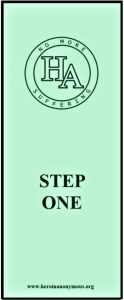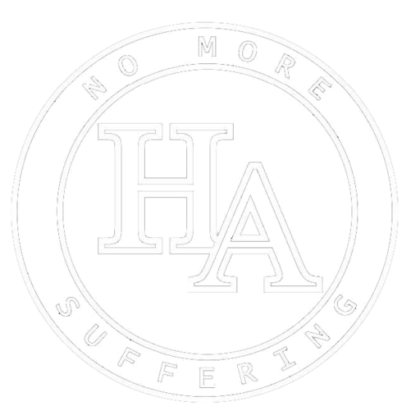STEP ONE

“We admitted we were powerless over heroin – that our lives had become unmanageable.”
Admitting we were powerless over heroin or anything else for that matter was a difficult task for many of us. We did not want to admit we could not control our heroin usage and that we could not manage our life. Most of us wished to be in control of our using and convinced ourselves we could stop anytime we wanted.
We discovered that we had lost the power to choose whether we would use or not. If we truly had the power to do that, we would have exercised that power a long time ago. There were times we deluded ourselves into thinking “Well at least one stopped for a short period of time, therefore I can stop anytime I want to.” If that were true, we would have stopped all together.
Sometimes we tried to rely on our memories of suffering to keep us sober. We would tell ourselves “If I can simply remember how horrible it was the last time I kicked, I’ll stay sober.” We realized that no matter how hard we tried to recall the pain and suffering of our using, it did not keep us sober. At other times we tried to use our intellect to keep us sober. No matter how hard we tried, no matter what method we attempted, we all failed utterly.
We could no longer predict what would happen once we began using. Often we would tell ourselves “I’ll only get one paper” or “I’ll buy a gram and only use a little bit and save the rest for tomorrow.” Each time we ended up buying more or using all that was in front of us.
Sometimes our loved ones pleaded for us to stop using. We wanted to be a good parent, a loving spouse/partner, a trusted son or daughter. But no matter how much others begged for us to stop using, it was insufficient in keeping us sober.
Some of us were on probation or parole. We were threatened with jail if we used again. Sometimes employers threatened to fire us if we screwed up one more time. We believed these circumstances would enable us to stay sober. However, no matter how many consequences we were facing, no matter how much we risked losing, we ended up using one more time.
When faced with mental obsession for using, we tried various methods to get rid of these thoughts in our minds. We tried to stay busy, we tried using other substances to distract us, we tried to tell ourselves we would not use, we tried to rely on our will power, or we tried to convince ourselves that if we changed our thinking we would stay sober. In the end we used one more time, feeling frustrated, disappointed, telling ourselves it would be different next time.
The ultimate truth became apparent. We were unable to manage our lives. If we were successful in managing our lives, we would be currently doing so. It was a crushing blow to discover that no matter how hard we tried; we completely failed at managing our lives.
When we finally realized there was absolutely nothing we could do to keep ourselves sober, we surrendered. It became obvious that our ideas, our way of doing things, our way of coping, our methods, did not work. For the first time in our lives we acknowledged that we lacked power, we did not have the power or the means to stop using. And finally, we admitted complete defeat.
We began to consider another way of living. We began to entertain the reality that until we surrendered, until we were willing to give up our old ideas, we could not produce the desire to seek some kind of power that would enable us to stay sober.
It became apparent that the more hopeless we felt, the more receptive we became to seek some power from something outside of human power. We discovered this to be the very nature of surrender. We became conscious of the fact that we are guaranteed to use again as long as we relied on our own ideas and on our own will power. We realized that we did not possess the power to stay sober.
The moment of truth was sinking in. We could not stay sober by ourselves. This conclusion became evident as a result of discovering what we could not do, rather than what we could do about our using.
Once we made this surrender, we began to experience hope. We were shown that we no longer needed to live the way we were living. Hope was instilled in us as we saw others with our using experiences leading productive, happy, joyous lives. We must have the help of others who have found a new way of living. There is no more aloneness, no more despair, no more suffering. We are now free. We are men and women who have found freedom and peace of mind far beyond our imaginations.
